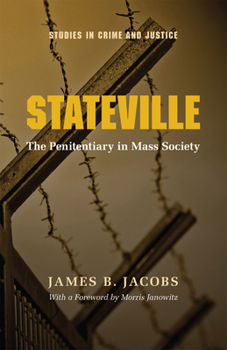Stateville: The Penitentiary in Mass Society
Select Format
Select Condition 
Book Overview
Stateville penitentiary in Illinois has housed some of Chicago's most infamous criminals and was proclaimed to be "the world's toughest prison" by Joseph Ragen, Stateville's powerful warden from 1936 to 1961. It shares with Attica, San Quentin, and Jackson the notoriety of being one of the maximum security prisons that has shaped the public's conception of imprisonment. In Stateville James B. Jacobs, a sociologist and legal scholar, presents...
Format:Paperback
Language:English
ISBN:0226389774
ISBN13:9780226389776
Release Date:September 1978
Publisher:University of Chicago Press
Length:300 Pages
Weight:0.74 lbs.
Dimensions:0.7" x 5.3" x 8.5"
Customer Reviews
1 rating
The Prison in Society: 1900-1975
Published by Thriftbooks.com User , 20 years ago
I highly recommend this book to those interested in the American prison system. Jacobs received extraordinary access to prisoners, guards, staff and records at Stateville. This access, coupled with his dual background is sociology and law, makes for a compelling book.I held off reading this book for a month after I received it, mostly because I was concerned that it would be dated. The book ends in 1975. None the less, I still came away with a sense that age takes nothing away from Jacob's thesis. Jacobs uses a historical approach to document several phases in the life of the prison as an institution.He starts in the early 20th century, when the prison was used as a source for political patronage and "anarchy ruled." This phases was followed by the authoritatian regime of Warden Ragen. Ragen takes center stage as the most compelling figure in the book. While one might expect Ragen to come across as an midevial ogre, quite the opposite is true. Jacobs demonstrates that while Ragen had his harsh moments, prisoners were actually treated as well and sometimes better during his 25 year long tenure.Ragen's "authoritaianism" is followed by the emergence of the bureocratic "legal-rational" regime of the 60's and 70's. Again, where one might expect Jacobs to be most sympathetic, he suprises. He paints a picture of an insitution in decline. Although the ideology of the new regime is "prisoner friendly", the prisoners actually suffer from a decline in quality of life.The final phase of the prison concerns the introduction of Chicago "super-gangs". In this section, Jacobs is like a man standing at the lip of the Grand Canyon. Obviously, you don't need to be a sociologist to know that gangs are THE story in corrections over the last thirty years. You can hardly blame Jacobs for not focusing more on this theme. After all, gangs had just begun to infiltrate in the time he was writing.The conclusions of this book will suprise most readers.





